Line 3 pipeline
The Line 3 pipeline is an oil pipeline owned by the Canadian multinational Enbridge. Operating since 1968, it runs 1,031 miles (1,659 km) from Hardisty, Alberta, Canada to Superior, Wisconsin, United States.
| Line 3 Pipeline | |
|---|---|
| Location | |
| Country | Canada United States |
| From | Hardisty, Alberta |
| To | Superior, Wisconsin |
| General information | |
| Type | Crude oil |
| Owner | Enbridge |
| Commissioned | 1968 |
| Technical information | |
| Length | 1,659 km (1,031 mi) |
| Line 3 Replacement (Canada Segment) | |
|---|---|
| Location | |
| Country | Canada |
| General information | |
| Type | Crude oil |
| Status | Complete |
| Commissioned | December 2019[1] |
| Website | Canada segment |
| Line 3 Replacement (U.S. Segment)[2] | |
|---|---|
| Location | |
| Country | United States |
| General information | |
| Type | Crude oil |
| Status | Complete |
| Construction started | December 2020 |
| Commissioned | October 2021[3] |
| Website | U.S. segment |
Concerns about the safety of the pipeline led Enbridge to reduce its capacity. Over its history, the pipeline has been the source of millions of gallons of oil spills, including a 1991 oil spill in Grand Rapids, Minnesota, that was the worst inland oil spill in U.S. history. In 2014 Enbridge proposed the construction of a new pipeline segment along a different route in Minnesota which would increase the volume of oil that could be transported.[4] The replacement pipeline has been completed in Canada,[5] Wisconsin,[6] North Dakota,[7] and Minnesota.[8] Permitting and construction of the new pipeline has been met with resistance from Native American communities and climate justice groups.[9] Despite protests, the expansion was operational by 1 October, 2021.[10]
History
The original Line 3 pipeline began operating in 1968, initially owned by the Lakehead Pipeline Company.[11] The 34" wide, 1031-mile pipeline transports crude oil from Hardisty, Alberta,[12] to Superior, Wisconsin. The pipeline was not tested for flaws in its entirety until after 1976.[13]
Oil spills
From the 1970s until the 1991 spill, the Line 3 pipeline suffered 24 leaks due to the same seam failure[13] and was the source of 16 "large oil spills" resulting in four million gallons of oil spilled.[14] Officials with the Minnesota Pollution Control Agency estimated that a total of 5.7 million gallons had spilled from the Lakehead line from 1971 to 1992.[13] The Line 3 pipeline was the origin of a 1.3 million gallon oil spill in Argyle in 1973.[14] On March 3, 1991, the Line 3 pipeline ruptured in a wetland near Grand Rapids, Minnesota, spilling 1.7 million gallons of crude oil into the Prairie River, a tributary of the Mississippi River. It was the largest inland oil spill in the history of the United States of America. At the time of the 1991 spill, the pipeline carried 22 million gallons of oil every day.[15]
Expansion and new route
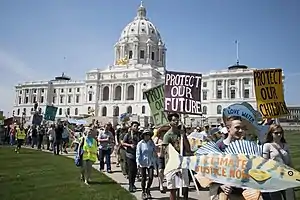
Structural deformities, including numerous cracks and holes have developed along the pipeline over time.[16] Resulting concerns about the safety of the pipeline have led Enbridge to reduce the amount of oil transported daily.[4] Due to concerns about the aging pipeline's leaks and spills, in 2014, Enbridge announced plans to build a replacement Line 3 pipeline.[11] That multi-billion dollar project would allow Enbridge to restore their historic operating capacity and move nearly 800,000 barrels of oil per day.[4][17] By 2016, governing bodies in Canada,[5] North Dakota,[7] and Wisconsin[6] had approved their segments of the pipeline. Construction of the new Line 3 was completed everywhere but Minnesota by November 2020.[18][19]
The permitting process has been more complicated in Minnesota where climate justice organizations, Native American groups, and government agencies have resisted the project.[20] Enbridge agreed to a new route for the replacement line, avoiding more sensitive watersheds and some Native American reservations. In 2018, the Minnesota Public Utilities Commission (PUC) solicited public input about the project.[21] Of the nearly 70,000 individual comments submitted, 68,244, or 94%, were in opposition.[21] Nevertheless, in June 2018 the PUC approved Enbridge's modified route and granted the Certificate of Need and Route Permit, both necessary for the project.[22]
As of December 2020, Minnesota state and federal regulators had granted Enbridge all of the permits required to construct the last stretch of the Line 3 pipeline through Minnesota.[23] The permits for this project have been consistently contested by Indigenous communities, environmental justice organizations, and the Minnesota Department of Commerce.[24] Although several of the pipeline's main permits were still facing appeals in court,[25] regulatory agencies had granted the remaining permits to Enbridge to begin construction by November 2020.[23]
Enbridge began construction of the new Line 3 oil pipeline across northern Minnesota in December 2020, shortly after final permits were issued.[26] The Biden administration supported the pipeline.[27] However, the pipeline still faced significant resistance until its completion in September 2021.[28] The pipeline expansion became operational on 1 October 2021.[29]
Ongoing opposition following final permit approval
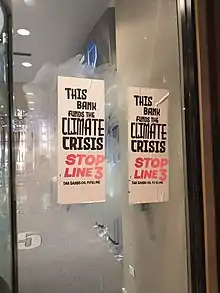
Several parties, including Ojibwe tribes, environmental organizations, and the Minnesota Department of Commerce, are still appealing the project in court.[25] In March 2021, the Minnesota Court of Appeals heard testimony from Enbridge, the PUC, and appealing parties.[30] The plaintiffs brought forth several challenges to the pipeline, most notably questioning whether the energy transfer company had ever proved that there would be enough continued demand for tar sands oil to justify construction of Line 3.[25] A ruling is expected on the appeals in June 2021 which could lead to a revocation of Enbridge's permits for construction.[31]
Outside the courts, Indigenous-led groups have organized opposition to Line 3, delaying construction along the pipeline route through non-violent direct action and protest.[32] Groups like the Giniw Collective,[33] Camp Migizi,[34] Honor the Earth,[35] and the RISE Coalition[36] staged dozens of protests attended by thousands of people in the first four months of construction.[37] As of April 2021, more than 200 people had been arrested for protesting along the pipeline route.[38] At the time of the pipeline's completion, nearly 900 people were facing charges related to pipeline resistance in northern Minnesota.[39]
On June 7, 2021, protesters referring to themselves as water protectors organized a gathering at the White Earth Indian Reservation. The gathering, attended by "around 2,500 people",[40] culminated in two direct actions. Over 200 protesters occupied an Enbridge pumping station and barricaded access.[41] Subsequently, police in riot gear began making arrests.[42][43] 247 people were arrested. 68 were released after receiving citations for unlawful assembly and public nuisance while another 179 were charged with trespassing.[44]
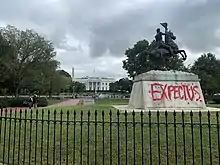
The Equestrian statue of Andrew Jackson in Lafayette Square just to the north of the White House was vandalized with the words "Expect Us" on Indigenous Peoples' Day (also Columbus day), Monday, October 11, 2021. Protesters had been chanting "respect us or expect us" in response to protesting the Line 3 pipeline in Minnesota that runs through lands owned by Indigenous tribes who are concerned that the pipeline could spill and ruin the land they use to hunt, fish, gather, and farm.[45]
Debate in Minnesota
.png.webp)
Climate change
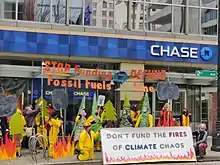
Much of the resistance to the Line 3 project comes from concerns over climate change. Climate justice groups such as the North Star Chapter of the Sierra Club,[46] MN350,[47] and Honor the Earth[48] have campaigns to "Stop Line 3."[49] The Environmental Impact Statement (EIS), which was conducted by the Minnesota Department of Commerce, explains how the new Line 3 pipeline would contribute to deforestation, increase risk of pollution to Minnesota's pristine water ecosystems and wild rice beds, and generate the greenhouse gasses that contribute to climate change.[16] In fact, a study authored by over a dozen climate justice organizations found that the greenhouse gas emissions from constructing the new Line 3 pipeline would be equivalent to building 50 new coal-fired power plants.[50] The EIS estimated that the social cost of carbon from those emissions would total more than $120 billion over 30 years.[51] The MN Department of Commerce under Governor Mark Dayton formally denounced the proposed Line 3 project on environmental grounds.[52] As of October 2020, that appeal had been renewed twice by Governor Tim Walz's administration.[53][54]
In light of the serious risks and effects on the natural and socioeconomic environments of the existing Line 3 and the limited benefit that the existing Line 3 provides to Minnesota refineries, it is reasonable to conclude that Minnesota would be better off if Enbridge proposed to cease operations of the existing Line 3, without any new pipeline being built.
— Minnesota Department of Commerce, The Bemidji Pioneer
In February 2021, U.S. Representative Ilhan Omar called on President Biden to stop the construction of the pipeline: "The decision that U.S. entities make on Line 3 is a decision made for the entire world, and for all coming generations of humanity. I urge you to make the one decision supported by the scientific consensus on climate change: Stop Line 3." A press release cited how the pipeline would "add five times as much greenhouse gas annually as Minnesota transportation produced in total in 2016."[55]
Oil spills
Many people are concerned about potential oil spills along Line 3.[56] Among other accidental releases, the original Line 3 pipeline was responsible for the largest ever inland oil spill in the U.S.[11] In 1991, 1.7 million gallons of oil ruptured from Line 3 in Grand Rapids, MN.[57] Enbridge was also responsible for the 2010 Kalamazoo River oil spill in Michigan.[11] Cleanup of that spill cost over a billion dollars and took nearly a decade.[11] In total, Enbridge has overseen over 800 oil spills between 1999 and 2010.[55] The resulting pollution has adversely affected the economy,[58] public health,[59] and the environment[60] in Michigan. Enbridge has reassured the public that pipeline safety is their primary goal, and they employ technology to monitor their pipelines and train employees on emergency response.[61] While big oil spills (>238 barrels of oil) have decreased in recent years,[62] activists in Minnesota say that the potential for even one serious spill is too much of a risk.[56] The Environmental Impact Statement of Line 3 acknowledges that some accidental release of oil is inevitable and that serious oil spills are possible.[62]
Ojibwe treaty rights
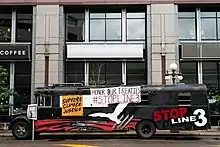
Some Native American communities in Minnesota have opposed the project on the basis of treaty rights. Most of the land in northern Minnesota was ceded to the U.S. through treaties with Ojibwe peoples throughout the 1800s.[63] Those treaties established reservations, as well as land use rights for Ojibwe people to hunt, fish, and harvest manoomin (wild rice) on the rest of the ceded territory.[64] The proposed route for the new Line 3 pipeline would cross through that protected land.[65] Several Ojibwe communities have said that construction of the pipeline would violate treaty rights by disrupting and threatening the resources promised to them on their ancestral land.[65] The Environmental Impact Statement acknowledges that construction of Line 3 would disrupt Native historic and cultural sites such as burial grounds.[66] However, a complete Traditional Cultural Properties Survey has not been conducted of the proposed route.[67]
Five Ojibwe bands have resisted the pipeline replacement project in court. The White Earth, Red Lake, Mille Lacs, Fond du Lac, and Leech Lake bands all opposed the pipeline and held status as intervening parties against the project in the PUC's initial permit deliberations.[68] After the PUC's June 2017 approval, the White Earth and Red Lake bands were part of a joint appeal of the Certificate of Need,[69] while the Mille Lacs, White Earth, and Red Lake bands appealed the Environmental Impact Statement.[70] In August 2018, the Fond du Lac band signed a right-of-way agreement with Enbridge, allowing the company to route the pipeline through their reservation.[71] Ahead of that decision, Tribal council chairman Kevin Dupuis, Sr., said “as a sovereign nation, we are confounded that we are being forced to choose between two evils as both routes pass through our lands,” either through the reservation or ceded treaty land.[72] The Leech Lake Band also stepped back from formal appeals in December 2018 when Enbridge agreed to remove the old pipeline from their reservation if construction of the new pipeline begins.[73]
Drug and sex trafficking
Native activists and allies are bringing awareness to the connection between fossil fuel infrastructure projects like Line 3 and increased drug and sex trafficking in and around Native American reservations.[74] While oil pipelines like Line 3 are being built, the construction workers stay in concentrated, temporary housing along the route, often known as “man camps.”[75] The high wages and social isolation in man camps lead to increased drug use, as well as violence perpetrated by employees on the surrounding Native communities.[76] In 2019, Native and climate justice activists held a “March on Enbridge to Protect the Sacred,” at the Enbridge terminal in Clearbrook, Minnesota.[77] They demanded an end to the Line 3 project citing, among other things, “the direct link between the fossil fuel industry and Missing and Murdered Indigenous Women and Relatives.”[78] The Environmental Impact Statement on Line 3 acknowledges that connection as well, saying “The addition of a temporary, cash-rich workforce increases the likelihood that sex trafficking or sexual abuse will occur.”[79] Under the EIS, Enbridge was required to prepare a Human Trafficking Prevention Plan for the project.[80][81] Enbridge's plan has been critiqued, however, as a step made more to follow procedure than a true commitment to ending violence by their employees.[74][82] Groups of Native activists and climate justice organizers maintain opposition to the pipeline over the potential for increased violence and drug trafficking along the proposed pipeline route.[83][84][85][86]
Pipeline "abandonment"
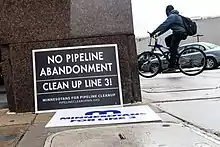
The agreement between Enbridge and the Leech Lake Band centers on another debate about what will happen to the infrastructure of the old Line 3 pipeline if the new one is built. Enbridge proposed a process they call "deactivation."[4] Many who oppose the project call this "abandonment."[87] Enbridge explains deactivation of a pipeline as a 5 step process: remove the oil, clean the pipe, disconnect it from facilities, put corrosion controls in place, and then leave the pipe in the ground.[4] Minnesotans for Pipeline Cleanup, an organization opposed to Line 3, has expressed concerns about the potential for pollutants to remain after the cleanup.[88] Many landowners along the old route worry that they will bear the financial burden for the decommissioned pipe, either through costs of cleanup, removal, or lost property value.[88][89] Both the Pipeline Abandonment Report from Minnesotans for Pipeline Cleanup and the Chippewa Cumulative Impact Statement, written to supplement the EIS, mention that Line 3 would be the first pipeline ever to be decommissioned in Minnesota, and worry about what sort of precedent that might set.[88][89]
Job creation
Supporters of Line 3 cite job creation as a key reason to build the pipeline. A large study published by the University of Minnesota Duluth in 2017 claimed that the Line 3 Replacement Project would create thousands of jobs.[90] However, later that year, investigative journalists uncovered that a business group funded by Enbridge, APEX, had financed the study, and that data inputs for it were provided by Enbridge themselves.[91] In the end, a UMD Professor behind the research severed the school's ties with APEX.[92] While there might not be significant long term job creation, supporters assert that even some temporary employment would be a key source of income for numerous families in Minnesota.[93] The original EIS also distinguished between long and short term jobs, but came to different conclusions saying, "Based on the small number of permanent jobs, it is likely that operation of the pipeline would result in no to negligible impact on the per capita household income, median household income, or unemployment rates in the ROI (region of interest.)” [94] The pipeline's possible impact on jobs in Minnesota remains contested.
Tax revenue
Line 3 supporters argue that counties along the proposed route will benefit from the revenue of Enbridge's property taxes.[95] In the first year of the new pipeline's operations, Enbridge has been projected to pay $19.5 million in property taxes along the route.[96] That number would increase over time.[96] Those opposed to the pipeline are unconvinced about the promise of that revenue,[97] however, citing lawsuits in which Enbridge claimed that they had been overtaxed, and left counties across Minnesota in debt for tens of millions of dollars.[98]
Use for oil industry
Construction of the Line 3 pipeline would help the Canadian oil industry increase their production and stabilize prices. Enbridge has argued that Line 3 would help meet the demand of Minnesota's oil refineries,[99] and they are not the only company hoping the pipeline is built.[100] Line 3 is seen as key to the Canadian oil industry.[100] Difficulty transporting oil out of Alberta has led to production cuts and price discounting.[101] Thousands of Canadians have lost their jobs in oil infrastructure due to instability in Alberta's oil sands economy.[102] Additionally, companies which are unable to ship their product through pipelines have considered expanding train shipments of oil.[101] Recent studies have highlighted that train transportation of oil results in more regular spills than transport by pipe.[103][16] In his endorsement of Line 3, the Prime Minister of Canada, Justin Trudeau, supported this argument:[104]
(Transport of oil by rail) is less economic, and more dangerous for communities, and is higher in terms of greenhouse gas emissions than modern pipelines would be.
— Justin Trudeau, Canadian Prime Minister, CBC
Enbridge estimates that Line 3 would replace more than 10,000 rail cars transporting oil every day.[4] The group Minnesotans for Line 3 says that by approving the pipeline, government regulators could ensure safer transport of millions of barrels of oil a year.[105] The Minnesota Department of Commerce, in their testimony against Line 3, questioned these projections, claiming they fail to consider a variety of possible future demands for oil.[106]
References
- "Enbridge Starts Service on Canadian Section of Line 3". Pipeline & Gas Journal. December 2, 2019. Archived from the original on October 21, 2020.
- "Line 3 Replacement Project Fact Sheet" (PDF). Enbridge. Archived (PDF) from the original on September 16, 2021.
- "Enbridge's Long-Delayed Line 3 Oil Pipeline Project to Start Up Oct. 1". Pipeline & Gas Journal. September 29, 2021. Archived from the original on September 30, 2021.
- "Line 3 Replacement Project Summary" (PDF). Enbridge. Archived (PDF) from the original on 2018-06-19. Retrieved 2018-06-27.
- Bakx, Kyle (April 25, 2016). "NEB approves Enbridge Line 3 pipeline replacement". CBC. Archived from the original on June 30, 2018. Retrieved June 27, 2018.
- Verburg, Steven (August 30, 2016). "Wisconsin DNR approves 1 Enbridge oil line". Wisconsin State Journal. Archived from the original on June 27, 2018. Retrieved June 27, 2018.
- Liedke, Mattew (September 10, 2016). "Sandpiper deferred, but Enbridge is moving forward with Line 3 replacement". Grand Forks Herald. Archived from the original on June 28, 2018. Retrieved June 27, 2018.
- Williams, Nia (2021-09-29). "Enbridge's long-delayed Line 3 oil pipeline project to start up Oct. 1". Reuters. Retrieved 2022-01-03.
- Kraker, Dan (June 29, 2018). "Line 3 opponents girding for fight over approved pipeline". MPRNews. Archived from the original on June 29, 2018. Retrieved June 29, 2018.
- "Enbridge says Line 3 replacement complete, opens Friday". MPR News. 2021-09-29. Retrieved 2023-09-11.
- Nelson, Cody (April 23, 2018). "Line 3 timeline: From construction to present day battles". MPRNews. Archived from the original on June 27, 2018. Retrieved June 27, 2018.
- Kelley, Alexandra (June 8, 2021). "Pipeline foes double down on efforts to halt Line 3 construction". The Hill.
- Laszewski, Charles (November 12, 1992). "Record '91 Pipeline Leak One of Many on 325-mile Route". St. Paul Pioneer Press.
- "Company Revises Minnesota Oil Spill Upward to 1.7 Million Gallons". AP News. March 13, 1991. Archived from the original on March 3, 2021.
- Siple, Julie; Wareham, Bill; Kraker, Dan; Nelson, Cody (June 20, 2018). "Rivers of Oil, Episode 2: The largest inland spill". MPR News. Archived from the original on March 4, 2021.
- "Line 3 EIS: Executive Summary". Minnesota Department of Commerce. Archived from the original on 2018-06-27. Retrieved 2018-06-27.
- Solomon Associates (March 14, 2019). "Western Canadian Pipeline Capacities and Flow: Will We Have Enough Pipeline Capacity After 2021?". Archived from the original on June 4, 2019. Retrieved June 4, 2019.
- "Line 3 Replacement Project (U.S.)". Enbridge. Archived from the original on 2021-04-22. Retrieved 2021-04-22.
- "Line 3 Replacement Program (Canada)". Enbridge. Archived from the original on 2021-04-22. Retrieved 2021-04-22.
- Kraker, Dan (March 5, 2019). "Line 3 project delay leaves supporters, opponents hopeful". MPRNews. Archived from the original on December 8, 2019.
- "STATE OF MINNESOTA, OFFICE OF ADMINISTRATIVE HEARINGS, FOR THE PUBLIC UTILITIES COMMISSION; In the Matter of the Application of Enbridge Energy, Limited Partnership, for a Certificate of Need for the Line 3 Project in Minnesota from the North Dakota Border to the Wisconsin Border; In the Matter of the Application of Applicant Enbridge Energy, Limited Partnership for a Routing Permit for the Line 3 Project in Minnesota from the North Dakota Border to the Wisconsin Border; FINDINGS OF FACT, CONCLUSIONS OF LAW, AND RECOMMENDATION" (PDF). Minnesota Public Utilities Commission. Archived (PDF) from the original on 2018-06-27. Retrieved 2018-06-27.
- "State Regulators Approve Enbridge Pipeline Proposal Certificate of Need". 5 ABC: Eyewitness News. June 28, 2018. Archived from the original on June 29, 2018. Retrieved June 29, 2018.
- Lovrien, Jimmy; Ferguson, Dana (November 30, 2020). "Final permit for Enbridge Line 3 project OK'd by Minnesota Pollution Control Agency". Duluth News Tribune. Archived from the original on April 22, 2021. Retrieved April 22, 2021.
- Kraker, Dan (June 3, 2019). "MN court says PUC didn't weigh oil spill impact in Line 3 pipeline decision". MPR. Archived from the original on September 2, 2019. Retrieved September 9, 2019.
- Kraker, Dan (March 23, 2021). "MN appeals court hears arguments in Line 3 challenge, asking whether state needs another oil pipeline". MPR. Archived from the original on April 22, 2021. Retrieved April 22, 2021.
- Ibrahim, Mohamed (December 1, 2020). "Enbridge starts construction on Line 3 in Minnesota". ABC News. Archived from the original on April 22, 2021. Retrieved April 22, 2021.
- "Biden Administration Backs Oil Sands Pipeline Project". The New York Times. July 24, 2021.
- "'Squad' members call on Biden to shut down Line 3 pipeline in Minnesota". The Hill. September 3, 2021.
- "Enbridge says Line 3 replacement complete, opens Friday". MPR News. September 29, 2021. Retrieved January 3, 2022.
- Ibrahim, Mohamed (March 21, 2021). "Enbridge Line 3 pipeline argued in appeals court". Indian Country Today. Archived from the original on April 22, 2021. Retrieved April 22, 2021.
- Lovrien, Jimmy (March 23, 2021). "Judges question whether Enbridge, regulators actually proved Line 3 is needed". Duluth News Tribune. Archived from the original on April 22, 2021. Retrieved April 22, 2021.
- Arvin, Jariel (March 25, 2021). "The Indigenous-led fight to stop the Line 3 oil pipeline expansion in Minnesota, explained". Vox. Archived from the original on April 22, 2021. Retrieved April 22, 2021.
- Regan, Sheila (February 19, 2021). "'It's cultural genocide': inside the fight to stop a pipeline on tribal lands". The Guardian. Archived from the original on April 22, 2021. Retrieved April 22, 2021.
- Kraker, Dan (March 25, 2021). "Line 3 construction brings complication, controversy to Fond du Lac Reservation". MPR. Archived from the original on April 22, 2021. Retrieved April 22, 2021.
- Arvin, Jariel (March 21, 2021). "The Indigenous-led fight to stop the Line 3 oil pipeline expansion in Minnesota, explained". Vox. Archived from the original on April 22, 2021. Retrieved April 22, 2021.
- Engelfried, Nick (December 14, 2020). "Indigenous-led resistance to Enbridge's Line 3 pipeline threatens Big Oil's last stand". Waging Nonviolence. Archived from the original on March 2, 2021. Retrieved April 22, 2021.
- Pollack, Nicole (March 8, 2021). "As the Line 3 Pipeline Pushes Forward, Water Protectors Push Back". Sierra. Archived from the original on April 22, 2021. Retrieved April 22, 2021.
- Koenig, Kailani; Perry, Cal (March 26, 2021). "A fight is brewing over an oil pipeline and it's pitting Native groups against Big Oil". NBC News. Archived from the original on April 22, 2021. Retrieved April 22, 2021.
- Marohn, Kristi (4 October 2021). "Criminal Cases Against Line 3 Protesters Clog Court System". U.S. News & World Report. Retrieved 3 January 2022.
- "Jane Fonda slams Biden as not 'bold or fast' enough on climate crisis amid oil line protest". The Independent. 2021-06-08. Archived from the original on 2022-06-14. Retrieved 2021-06-09.
- "Protesters clash with police at Enbridge pipeline construction site in Minnesota". Reuters. 2021-06-07. Retrieved 2021-06-09.
- Tabuchi, Hiroko; Furber, Matt; Davenport, Coral (2021-06-07). "Police Make Mass Arrests at Protest Against Oil Pipeline". The New York Times. ISSN 0362-4331. Retrieved 2021-06-09.
- Thompson, Darren. "Line 3 Resistance Grows, Hundreds Camped at Mississippi as Hundreds were Arrested in Hubbard County". Native News Online. Retrieved 2021-06-09.
- Kolpack, Dave (June 9, 2021). "Police say nearly 250 arrested in Minnesota pipeline protest". AP News. Archived from the original on June 10, 2021. Retrieved June 13, 2021.
- Severi, Misty (October 11, 2021). "'Respect us or expect us': Andrew Jackson statue vandalized in front of White House". Retrieved October 13, 2021.
- "Line 3 and the Pipeline System" (PDF). Sierra Club North Star Chapter. Archived (PDF) from the original on 2017-10-16. Retrieved 2018-06-27.
- "Pipeline Resistance". MN350. Archived from the original on 2018-06-27. Retrieved 2018-06-27.
- "Line 3". Honor the Earth. Archived from the original on 2018-06-27. Retrieved 2018-06-27.
- "Stop the Line 3 Pipeline". Stop Line 3. Archived from the original on 2018-07-02.
- "A Giant Step Backward" (PDF). Price of Oil. Archived (PDF) from the original on 2020-10-30.
- Orenstein, Walker (June 4, 2019). "A setback for Line 3: What the latest court ruling means for the future of the project". MinnPost. Archived from the original on August 23, 2019.
- Johnson, Brooks (September 11, 2017). "Enbridge Line 3 replacement not needed, Minn. commerce department says". Bemidji Pioneer. Archived from the original on June 27, 2018. Retrieved June 27, 2018.
- Kraker, Dan (February 12, 2019). "Walz's Commerce Dept. to renew Line 3 appeal". MPRNews. Archived from the original on March 28, 2020.
- Kraker, Dan. "Walz administration keeps up fight against Line 3". Minnesota Public Radio. Archived from the original on 2020-11-01.
- "Rep. Ilhan Omar calls on Biden to Reject Line 3 Pipeline". Ilhan Omar. 3 February 2021. Archived from the original on 24 February 2021. Retrieved 1 March 2021.
- Kraker, Dan (May 27, 2019). "Spill fears rise even as Line 3 backers vow new pipeline will be safe". MPRNews. Archived from the original on June 27, 2018. Retrieved June 27, 2018.
- "Company Revises Minnesota Oil Spill Upward to 1.7 Million Gallons". AP News. March 13, 1991. Archived from the original on June 27, 2018. Retrieved June 27, 2018.
- Chicklas, Dana (July 20, 2016). "2010 Enbridge oil spill in Kalamazoo River: a lasting effect on local business". FOX 17 West Michigan. Archived from the original on June 28, 2018. Retrieved June 27, 2018.
- "Public Health Assessment Kalamazoo River/Enbridge Spill" (PDF). Michigan Department of Community Health. May 23, 2012. Archived (PDF) from the original on April 30, 2017. Retrieved June 27, 2018.
- Parham, Georgia (June 8, 2015). "For Immediate Release: Enbridge Must Restore Environment Injured by 2010 Kalamazoo River Oil Spill". U.S. Fish & Wildlife Service. Archived from the original on June 28, 2018. Retrieved June 27, 2018.
- "Our commitment to pipeline safety" (PDF). Enbridge. Archived (PDF) from the original on 2018-06-28. Retrieved 2018-06-27.
- "Line 3 EIS: Chapter 10 - Accidental Crude Oil Releases". Minnesota Department of Commerce. Archived from the original on 2018-06-27. Retrieved 2018-06-27.
- Enger, John (February 1, 2016). "Explaining Minnesota's 1837, 1854 and 1855 Ojibwe treaties". MPRNews. Archived from the original on August 31, 2019.
- "Line 3 and Treaty Rights" (PDF). Sierra Club North Star Chapter. Archived (PDF) from the original on 2019-06-17.
- "Treaty Rights and Oil Pipelines: What You Need to Know" (PDF). Honor the Earth. Archived (PDF) from the original on 2021-01-11.
- "Line 3 EIS: Chapter 9 - Tribal Resources". Minnesota Department of Commerce. Archived from the original on 2018-06-27. Retrieved 2018-06-27.
- Hughlett, Mike (January 4, 2018). "Tribes ask PUC to reconsider review of new Enbridge pipeline route, saying cultural study wasn't done". Star Tribune. Archived from the original on June 27, 2018. Retrieved June 27, 2018.
- "5 Ojibwe Tribes Intervene in Minnesota's Contested Case Process for Line 3". Stop Line 3. July 13, 2017. Archived from the original on June 27, 2018. Retrieved June 27, 2018.
- Kraker, Dan (December 19, 2018). "Line 3 pipeline opponents file suit challenging state approval". MPRNews. Archived from the original on September 13, 2019.
- Kraker, Dan (June 3, 2019). "MN court says PUC didn't weigh oil spill impact in Line 3 pipeline decision". MPRNews. Archived from the original on September 2, 2019.
- Kraker, Dan (August 31, 2018). "Enbridge, Fond du Lac Band reach deal to route Line 3 through reservation". MPRNews. Archived from the original on November 13, 2019.
- "Fond du Lac Band says all options open regarding Line 3". Duluth News Tribune. August 3, 2018. Archived from the original on January 4, 2019.
- Bowen, Joseph (December 14, 2018). "Leech Lake, Enbridge reach agreement to remove existing Line 3 if new pipeline is built". The Bemidji Pioneer. Archived from the original on April 26, 2020.
- Walsh, Kayla. "Moving More than Oil: The intimate link between human trafficking and dirty energy in Minnesota". Earth Island Journal. Archived from the original on 2020-03-28.
- Horwitz, Sari (September 28, 2014). "Dark side of the boom: North Dakota's oil rush brings cash and promise to reservation, along with drug-fueled crime". The Washington Post. Archived from the original on June 2, 2021.
- Kathryn Nagle, Mary; Steinem, Gloria (September 29, 2016). "Sexual assault on the pipeline". Boston Globe. Archived from the original on April 13, 2020.
- Diehl, Amelia (October 14, 2019). "On Indigenous People's Day, Anishinaabeg Leaders March Against Enbridge's $7.5 Billion Oil Pipeline". In These Times. Archived from the original on May 2, 2020.
- "March to Protect The Sacred on Indigenous People's Day 2019". Unicorn Riot. October 14, 2019. Archived from the original on March 28, 2020.
- ""Line 3 EIS: Chapter 11 - Environmental Justice"" (PDF). Department of Commerce. Archived (PDF) from the original on 2020-08-03.
- "Public Utilities Commission, Enbridge need to go back to square one on Line 3's Human Trafficking Prevention Plan". Healing Minnesota Stories. September 12, 2019. Archived from the original on January 15, 2020.
- "More people are talking about it now': The fight to eliminate human trafficking". Enbridge. January 28, 2019. Archived from the original on March 28, 2020.
- LaDuke, Winona (January 16, 2020). "New Faces of Courage". Duluth Reader. Archived from the original on March 28, 2020.
- "Man Camps Fact Sheet". Honor the Earth. Archived from the original on 2020-03-28.
- "Issues: Construction Impacts". Stop Line 3. Archived from the original on 2020-03-28.
- "Stop Line 3". Sierra Club. 22 June 2018. Archived from the original on 2020-03-28.
- Evelyn, Julia (13 December 2019). "The history and future of Line 3 resistance". MN350. Archived from the original on 2020-09-28.
- "Line 3 Abandonment Factsheet". Minnesotans for Pipeline Cleanup. Archived from the original on 2018-06-28. Retrieved 2018-06-27.
- "Enbridge's Mess An Historic Moment for Minnesota Landowners" (PDF). Minnesotans for Pipeline Cleanup. Archived (PDF) from the original on 2018-06-27. Retrieved 2018-06-27.
- "Chippewa Cumulative Impact Assessment: Chapter 4" (PDF). Minnesota Chippewa Tribe. Archived (PDF) from the original on 2018-06-27. Retrieved 2018-06-27.
- "New study: Economic impact of Enbridge Line 3 will be massive". Business North. June 13, 2017. Archived from the original on September 8, 2019.
- Seidman, Derek (November 15, 2017). "The University of Minnesota Duluth Sold Its Credibility to Enbridge. Can It Get It Back?". Eyes on the Ties. Archived from the original on August 10, 2020.
- Seidman, Derek (December 21, 2017). "UPDATE: University of Minnesota Duluth Professor Resigns from Board of Enbridge-Backed Group in Response to PAI Report". Eyes on the Ties. Archived from the original on December 9, 2019.
- "Enbridge poised to provide jobs". Mesabi Daily News. October 25, 2016. Archived from the original on June 25, 2017.
- "Line 3 EIS: Chapter 5 - Existing Conditions, Impacts, and Mitigation - Certificate of Need". Minnesota Department of Commerce. Archived from the original on 2018-06-27. Retrieved 2018-06-27.
- "The Line 3 Replacement Project: Safety, Efficiency, Jobs". Minnesotans for Line 3. Archived from the original on 2018-06-27. Retrieved 2018-06-27.
- "Line 3 Replacement Project". Enbridge. Archived from the original on 2018-06-28. Retrieved 2018-06-27.
- "Understanding the Minnesota DOC's Opposition Testimony for Line 3". Honor the Earth. Archived from the original on 2018-06-27. Retrieved 2018-06-27.
- Hughlett, Mike (May 15, 2018). "Enbridge prevails in Minnesota property tax challenge". Star Tribune. Archived from the original on June 28, 2018. Retrieved June 27, 2018.
- Kraker, Dan (October 11, 2017). "Enbridge argues Line 3 oil pipeline needed for Minnesota, region". MPRNews. Archived from the original on March 6, 2020.
- Orland, Kevin (March 2, 2019). "Enbridge Pipeline Delayed a Year in Hit to Canadian Oil Industry". Bloomberg.com. Archived from the original on 2019-10-30.
- Slav, Irina (December 3, 2018). "Alberta Enforces 8.7% Oil Production Cut". Oilprice.com. Archived from the original on November 8, 2019.
- "Canada to lose 12,500 oil and gas jobs in 2019, report predicts, mostly in Alberta". April 8, 2019. Archived from the original on June 2, 2021.
- Morris, David (August 28, 2016). "Pipelines: The Worst Way to Move Oil, Except For All the Rest". Fortune. Archived from the original on June 27, 2018. Retrieved June 27, 2018.
- Tasker, John (November 29, 2016). "Trudeau cabinet approves Trans Mountain, Line 3 pipelines, rejects Northern Gateway". CBC. Archived from the original on June 19, 2018. Retrieved June 27, 2018.
- "Fact Check Friday #8: Supply, demand and why pipelines like Line 3 are so important". Minnesotans for Line 3. May 11, 2018. Archived from the original on June 27, 2018. Retrieved June 27, 2018.
- "Direct Testimony of Dr. Marie Fagan on Behalf of Minnesota Department of Commerce Division of Energy Resources" (PDF). Minnesota Department of Commerce. September 11, 2017. p. 5. Archived (PDF) from the original on June 27, 2018. Retrieved January 23, 2021.